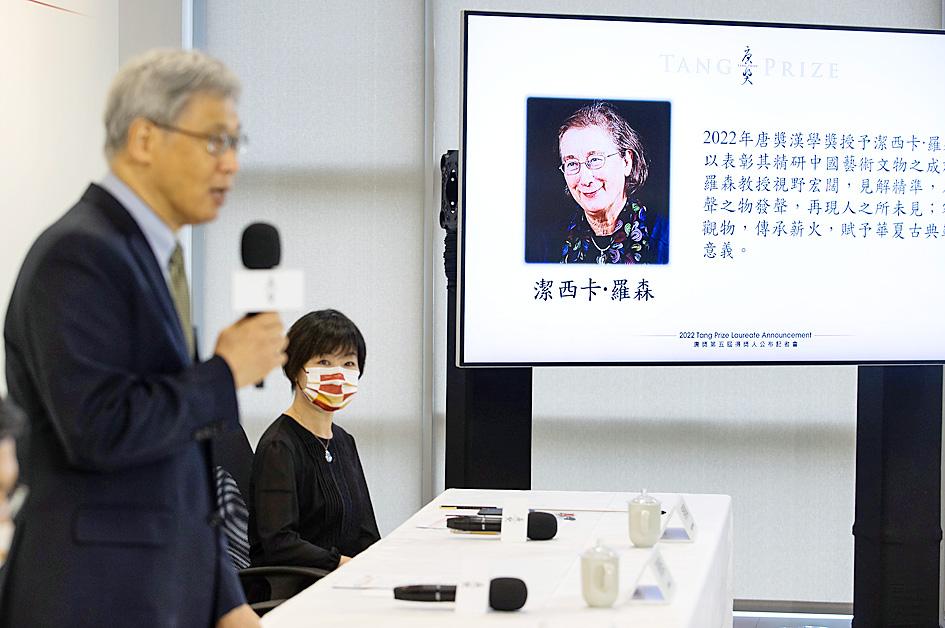Jessica Rawson, a British art historian and curator specializing in ancient Chinese art, has been named this year’s winner of the Tang Prize in Sinology for “her gift and mastery of the craft of the visible to read the art and artifacts of Chinese civilization.”
Tang Prize selection committee for Sinology chairman David Wang (王德威), a Chinese literature academic and Academia Sinica academician, made the announcement at a news conference in Taipei yesterday.
“By giving voice to the ancient world of objects, Jessica Rawson has taught generations how to see when they look at things, and her acuity and vast visual learning have given a new insight into the world of the lineages, transformations and migrations of mute things,” Wang said.

Photo: CNA
The 79-year-old British academic said she was “incredibly honored” to be awarded the prize.
Rawson is considered a leading art historian of ancient Chinese art, with a particular interest in the cosmology of the Chinese Han period and its relationship to tombs and their decorations.
She has written numerous books on topics such as Chinese jade, Chinese poets from the 7th to the 13th centuries and Chinese silver of the Tang Dynasty, and was a renowned keeper of Oriental Antiquities at the British Museum.
After many years at the British Museum, Rawson was Warden of Merton College, University of Oxford, from 1994 until her retirement in 2010. She served as pro-vice chancellor at the university for five years from 2006.
She is currently an honorary research associate at the university’s School of Archaeology.
Her achievement in Chinese studies has also won her a number honors in China, among them an honorary professorship at Peking University.
“I started to be interested in China at a very, very young age when I was in primary school,” Rawson said after learning she had been awarded the prize.
She said her mother, who was interested in art and culture, introduced her to East Asian art, in particular the art of China and Japan, and that was when she fell in love with Chinese characters.
That interest evolved when she was a student at the University of Cambridge. While studying there, Rawson did her first major excavation in Jordan, where archeologists unearthed Chinese ceramics that had arrived through trade with the Middle East.
“I started to see archeology was the way to learn more about China,” she said.
The Tang Prize Foundation said that Rawson’s contributions show that “besides the written word, there is another talent, another craft, which, by reading the arts and artifacts of the world, allows us to interpret and understand distant and ancient societies, with their beliefs and interactions.”
Rawson also develops and promotes exchanges in the field of sinology to help the public better understand Chinese civilization with the exhibitions she curated at the British Museum, it said.
The Tang Prize is a biennial award established in 2012 by Taiwanese entrepreneur Samuel Yin (尹衍樑) to honor people who have made prominent contributions in four categories — sustainable development, biopharmaceutical science, sinology and rule of law.
The Tang Prize in Sinology recognizes the study of sinology, and awards are given for research on China and its related fields, such as Chinese thought, history, philology, linguistics, archeology, philosophy, religion, traditional canons, literature and art, excluding literary and art works.

A small number of Taiwanese this year lost their citizenship rights after traveling in China and obtaining a one-time Chinese passport to cross the border into Russia, a source said today. The people signed up through Chinese travel agencies for tours of neighboring Russia with companies claiming they could obtain Russian visas and fast-track border clearance, the source said on condition of anonymity. The travelers were actually issued one-time-use Chinese passports, they said. Taiwanese are prohibited from holding a Chinese passport or household registration. If found to have a Chinese ID, they may lose their resident status under Article 9-1

Taiwanese were praised for their composure after a video filmed by Taiwanese tourists capturing the moment a magnitude 7.5 earthquake struck Japan’s Aomori Prefecture went viral on social media. The video shows a hotel room shaking violently amid Monday’s quake, with objects falling to the ground. Two Taiwanese began filming with their mobile phones, while two others held the sides of a TV to prevent it from falling. When the shaking stopped, the pair calmly took down the TV and laid it flat on a tatami mat, the video shows. The video also captured the group talking about the safety of their companions bathing

PROBLEMATIC APP: Citing more than 1,000 fraud cases, the government is taking the app down for a year, but opposition voices are calling it censorship Chinese Nationalist Party (KMT) Chairwoman Cheng Li-wun (鄭麗文) yesterday decried a government plan to suspend access to Chinese social media platform Xiaohongshu (小紅書) for one year as censorship, while the Presidential Office backed the plan. The Ministry of the Interior on Thursday cited security risks and accusations that the Instagram-like app, known as Rednote in English, had figured in more than 1,700 fraud cases since last year. The company, which has about 3 million users in Taiwan, has not yet responded to requests for comment. “Many people online are already asking ‘How to climb over the firewall to access Xiaohongshu,’” Cheng posted on

A classified Pentagon-produced, multiyear assessment — the Overmatch brief — highlighted unreported Chinese capabilities to destroy US military assets and identified US supply chain choke points, painting a disturbing picture of waning US military might, a New York Times editorial published on Monday said. US Secretary of Defense Pete Hegseth’s comments in November last year that “we lose every time” in Pentagon-conducted war games pitting the US against China further highlighted the uncertainty about the US’ capability to intervene in the event of a Chinese invasion of Taiwan. “It shows the Pentagon’s overreliance on expensive, vulnerable weapons as adversaries field cheap, technologically